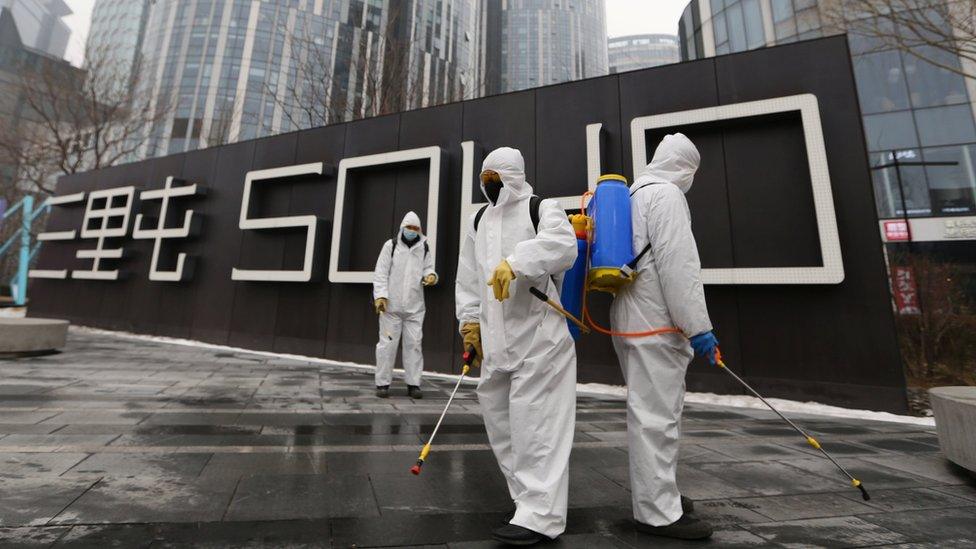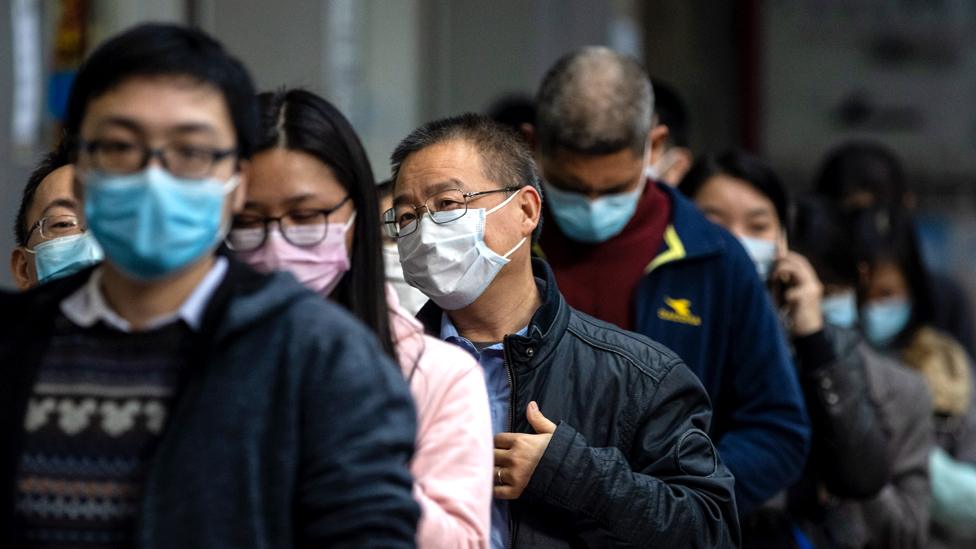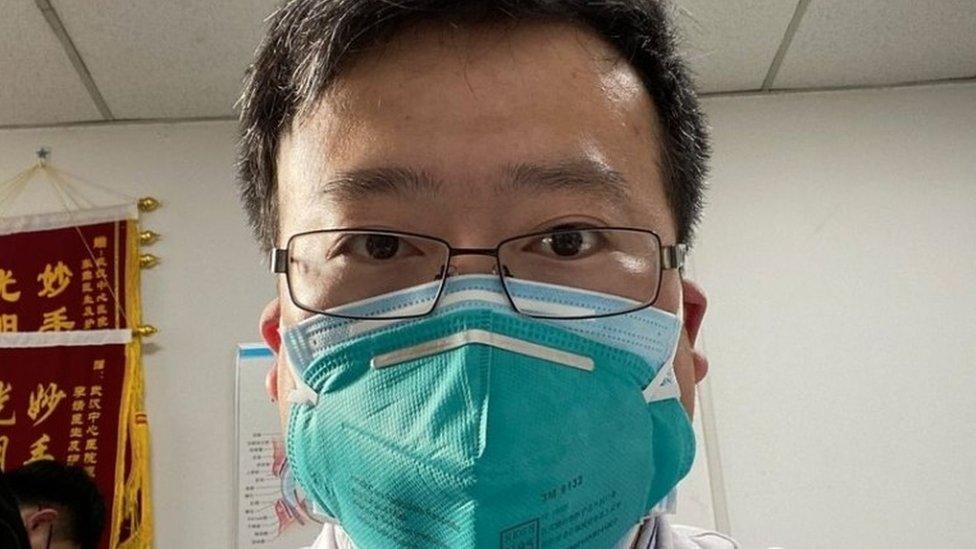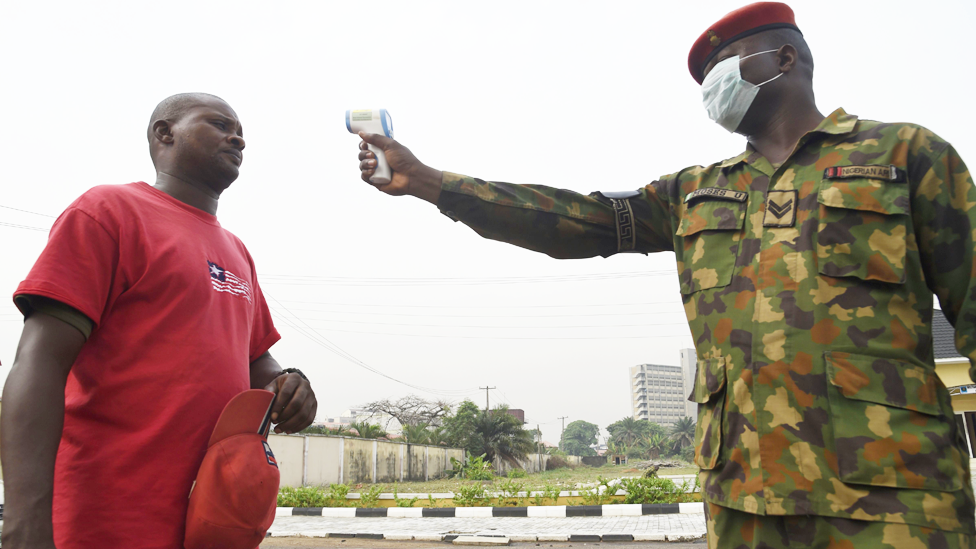Coronavirus: Beijing orders 14-day quarantine for returnees
- Published

More than 63,000 people in China have been infected with the coronavirus
Beijing has ordered everyone returning to the city to go into quarantine for 14 days or risk punishment in the latest attempt to contain the deadly new coronavirus, state media report.
Residents were told to "self-quarantine or go to designated venues to quarantine" after returning to the Chinese capital from holidays.
The measure came as Egypt confirmed the first coronavirus case in Africa.
Over 1,500 people have died from the virus, which originated in Wuhan city.
The notice on Friday from Beijing's virus prevention working group was issued as residents returned from spending the Lunar New Year in other parts of China.
The holiday was extended this year to help contain the outbreak.
More than 20 million people live in Beijing.
China's national health commission on Saturday reported 143 new deaths, bringing the toll to 1,523. All but four of the latest victims were in hard-hit Hubei province.
A further 2,641 people have been newly confirmed as infected, bringing the national total to 66,492.
Outside mainland China, there have been more than 500 cases in 24 countries, and three deaths: one each in Hong Kong, the Philippines and Japan.
A World Health Organization (WHO)-led mission to China will start its outbreak investigation work this weekend, focusing on how the virus - officially named Covid-19 - is spreading and its severity, director Tedros Adhanom Ghebreyesus said.
The mission, including international experts, will also look at how and when more than 1,700 health workers contracted the virus.
The team consists of 12 international members and their 12 Chinese counterparts.
"Particular attention will be paid to understanding transmission of the virus, the severity of disease and the impact of ongoing response measures," said Dr Mike Ryan, executive director of the WHO health emergencies programme.
Africa sees its first case
Egypt's health ministry on Friday confirmed the first case of the coronavirus in Africa.
The ministry described the person as a foreigner, but did not disclose the nationality.
It said it had notified the WHO, and the patient had been placed in isolation in a hospital.
Experts had earlier warned that it may not be long before the first case was confirmed in Africa, given its increasingly close ties to China.
Chinese health workers die in the outbreak
Chinese officials say six health workers have died.
Zeng Yixin, vice minister of China's National Health Commission, said 1,102 medical workers had been infected in Wuhan and another 400 in other parts of Hubei province.
"The duties of medical workers at the front are indeed extremely heavy; their working and resting circumstances are limited, the psychological pressures are great, and the risk of infection is high," Mr Zeng said, as quoted by Reuters news agency.
Medics in Wuhan resort to shaving their heads in a bid to prevent cross-infection of the coronavirus
Local authorities have struggled to provide protective equipment such as respiratory masks, goggles and protective suits in hospitals in the area.
On 7 February, the plight of medical workers was highlighted by the death of Li Wenliang, a doctor at Wuhan Central Hospital who had tried to issue the first warning about the virus on 30 December.
He had sent out a warning to fellow medics but police told him to stop "making false comments".
A wave of anger and grief flooded Chinese social media site Weibo when news of Dr Li's death broke.
What are the other developments?
In the UK, health officials contacted hundreds of people who attended a conference in London, after it emerged that one of them was diagnosed with coronavirus
China said it would stagger the return of children to school - several provinces have closed schools until the end of February
In Vietnam, which borders China, thousands of people in villages near the capital, Hanoi, have been put under quarantine after several cases were discovered. Vietnam has now confirmed at least 16 cases
The Red Cross has called for sanctions relief for North Korea, which would allow the aid agency to transfer funds to buy equipment. Testing kits and protective clothing are urgently needed to prepare for a possible outbreak, it says

Read more about the coronavirus and its impact
SHOULD WE WORRY? Our health correspondent explains
YOUR QUESTIONS: Can you get it more than once?
WHAT YOU CAN DO: Do masks really help?
UNDERSTANDING THE SPREAD: A visual guide to the outbreak

Are you in Hubei? Or do you have information to share? Get in touch by emailing haveyoursay@bbc.co.uk, external.
Please include a contact number if you are willing to speak to a BBC journalist. You can also contact us in the following ways:
WhatsApp: +44 7756 165803
Tweet: @BBC_HaveYourSay, external
Send pictures/video to yourpics@bbc.co.uk, external
Please read our terms & conditions and privacy policy
- Published14 February 2020

- Published7 February 2020

- Published13 February 2020
- Published13 February 2020

- Published12 March 2020
